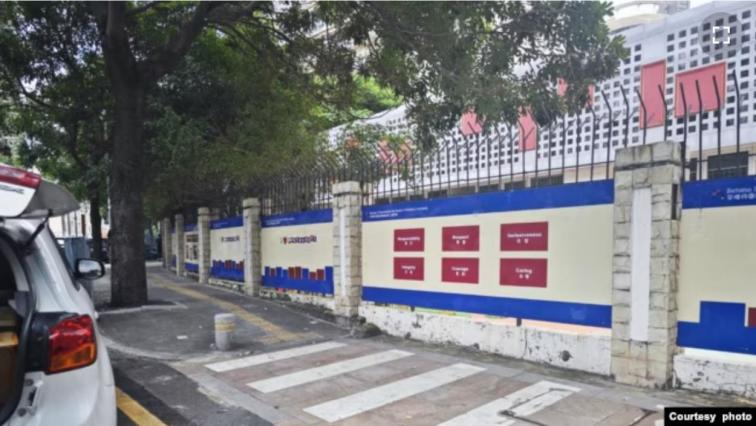Illustration: CCP Police Vehicle (China Photos/Getty Images)
[People News] A video has surfaced showing police in Shaoyang, Hunan Province, extorting an entrepreneur under the guise of addressing local financial difficulties, demanding 100 million yuan in exchange for "non-prosecution for a crime." Local private businesses claim that as China's economy declines and local debts grow, it has become common practice for police across various regions to engage in "distant fishing" schemes to extract money. Commentators suggest that local governments are fully exhibiting the Chinese Communist Party's (CCP) essence of "robbing and looting" under the guise of law, likening it to the infamous Myawaddy online scam groups but even more egregious.
According to a report by Radio Free Asia, a well-known blogger, "Teacher Li Is Not Your Teacher," posted a video on Thursday (23rd) exposing the Deputy Director of the Shaoyang Public Security Bureau and a division head threatening to charge an entrepreneur with a crime unless he paid 100 million yuan. This incident highlights how "nearshore" or "distant fishing" practices by Chinese police have become normalized.
The video, filmed on February 6 last year, appears to have been secretly recorded using surveillance equipment installed in a hotel room. It captures the police's extortion activities.
In the video, a man who appears to be the entrepreneur is seen lying on a bed with a blanket covering his body and most of his head. On another bed, a man not wearing a police uniform sits at an angle, exerting verbal threats. Another uniformed officer can be seen checking his phone. A plastic stool near the door seems to have been prepared for guards, and the overall scene aligns with the characteristics of the coercive police measure known as "residential surveillance."
The plainclothes officer uses a mix of threats and persuasion, first recounting the entrepreneur’s interactions with the police during questioning at the Hongshi Police Station and the Shaoyang County Detention Center. He then offers the bait of leniency, suggesting that the entrepreneur could return the embezzled funds and pay a hefty sum, in which case the police would ensure "non-prosecution for the crime."
Police in Shaoyang, Hunan Province, continued to threaten the detained entrepreneur with "non-prosecution," emphasizing that this would not mean he was off the hook. They claimed he had indeed violated the law and could have been charged with crimes such as "illegal business operations" and "providing tools for illegal intrusion into computer software systems," which carry penalties of over five years and up to three years in prison, respectively.
However, the police stated they had discussed the matter with the county prosecutor's office, the court, and the political-legal committee, reaching a general consensus. They argued that since the case did not involve grave offenses or public outrage, they could leverage legal loopholes to treat it leniently.
The police claimed their motive for handling the case was to alleviate local fiscal difficulties, not personal gain. They referred to an oral agreement allegedly reached between the entrepreneur and a deputy county head surnamed Yin, who proposed a one-billion-yuan settlement. The police urged the entrepreneur to honor this agreement and pay the money promptly.
The police also suggested they would treat the case as though it involved a “relative” and assured the entrepreneur, with supposed Party discipline as a guarantee, that there would be no deception involved. One officer noted, “Cases like this were rare before, but now they’re happening frequently in many places.”
Netizens quickly identified those involved, including Shaoyang County Public Security Bureau Deputy Director Tang Zhanxiong and County Deputy Head and Public Security Bureau Chief Yin Xiangfeng.
Radio Free Asia (RFA) attempted to contact the Shaoyang County Public Security Bureau but received no response.
RFA also spoke with an entrepreneur from Shaoyang, who requested anonymity. He confirmed that entrepreneurs in China are facing increasing difficulties and described such “distant fishing” practices as routine.
The local entrepreneur stated, “I saw the video. It shows Shaoyang County police detaining people from other regions to extort money, just like the conversation in the video with the local Shaoyang dialect—this is unmistakable. The video’s release is a private matter, and the police and relevant authorities certainly won’t issue any public statements. This kind of distant fishing is now the norm.”
Beijing-based artist and commentator Jifeng, interviewed by RFA, highlighted that strained local finances have led governments to revive the CCP’s origins as a predatory organization, treating entrepreneurs as prey.
Jifeng remarked, “The CCP originally seized power through force and robbery, and now, with fiscal shortfalls, they’ve returned to their roots—finding ways to extort money from private entrepreneurs. In the current environment, every entrepreneur is violating some law; otherwise, they wouldn’t be making money. The ones who make big money are all tied to corrupt officials, and these ties become their Achilles' heel, allowing the authorities to extort them. It’s all about paying up to avoid disaster. This happens far too often; it’s blatant extortion!”
Jifeng argued that the police’s actions are worse than those of the Myawaddy scam syndicates, warning that such practices will only accelerate the exodus of the wealthy.
“Myawaddy scams operate covertly, while these acts are carried out openly and blatantly. They’re worse than Myanmar’s Myawaddy scam groups. At least the latter works as thieves, but distant and nearshore fishing is conducted in the name of the law, under the banner of ‘rule of law.’ Now, anyone with money who can leave is fleeing.”
“Distant fishing” refers to cross-provincial or cross-regional law enforcement actions primarily aimed at generating economic benefits. As the Chinese economy declines, local governments face mounting debts and shrinking tax revenues. To bridge fiscal gaps, authorities often target businesses outside their jurisdictions, fabricating or exaggerating criminal charges to extract wealth.









News magazine bootstrap themes!
I like this themes, fast loading and look profesional
Thank you Carlos!
You're welcome!
Please support me with give positive rating!
Yes Sure!